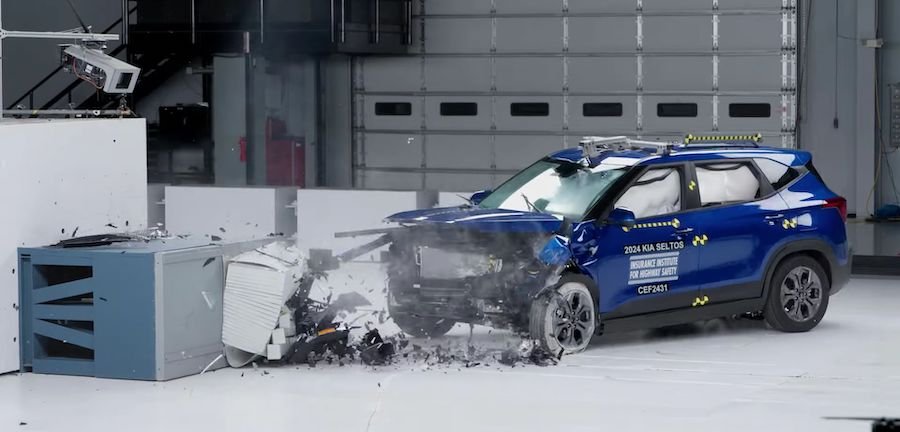2024 Kia Seltos Doesn't Qualify for IIHS Top Safety Pick Award

First of all, we should explain that the nonprofit organization uses four distinct ratings, those being good, acceptable, marginal, and poor. The subcompact utility vehicle couldn't do better than acceptable, for the driver may sustain a leg or foot injury in this kind of crash. As far as the rear occupant behind is concerned, the child-sized test dummy is prone to head or neck injuries.
Footage of the updated moderate overlap front crash test also shows the shoulder belt of the rear passenger moving too far upward, compromising the restrain system's effectiveness. The bad news also includes a marginal rating in the updated side impact test, acceptable front crash prevention system performance in vehicle-to-pedestrian scenarios, and headlight performance that varies between poor and acceptable. Yikes!
That's not all, though, for the volume of the seatbelt reminder was deemed insufficient. Finally, the LATCH system's lower anchors are located too deep in the outboard rear seats, making it difficult to fit a child seat.
Given the aforementioned, the nonprofit organization from Virginia couldn't give this fellow the Top Safety Pick award. It should be noted that the latter two evaluations are not part of the award criteria, but certain consumers care about the LATCH system's ease of use and the belt reminder system.
Also bear in mind that Kia might have improved the breed for model year 2025, although we'll have to wait a bit longer until the IIHS puts the newcomer through its paces. In the meantime, it's worth remembering that Seltos is a value-packed sport utility vehicle with nine standard driver-assistance features and standard all-wheel drive for the entry-level LX trim.
What comes as a bit of a surprise is that the better equipped S and EX grades are front-wheel drive by default, with all-wheel drive adding $1,500 and $2,200 to their final prices. The crème de la crème in the range are the X-Line and SX at $29,290 and $31,090 sans destination charge, with both packing all-wheel drive from the folks at Magna.
Dynamax is how this AWD system is called. The Dynamax features a multi-plate clutch and electro-hydraulic actuation, along with Torque Vectoring Corner Control for improved cornering capability and overall stability. Under the hood, LX through EX feature a 2.0-liter naturally aspirated I4, while X-Line and SX level up to a four-cylinder turbocharged 1.6-liter engine.
The lesser 2.0er is connected to Kia's Intelligent Variable Transmission, whereas the 1.6er comes with an eight-speed automatic. Combined fuel economy ranges from 31 miles per gallon (7.6 liters per 100 kilometers) for the 2.0 with front-wheel drive to 25 miles per gallon (9.4 liters per 100 kilometers) for the 1.6 with all-wheel drive.
Related News


